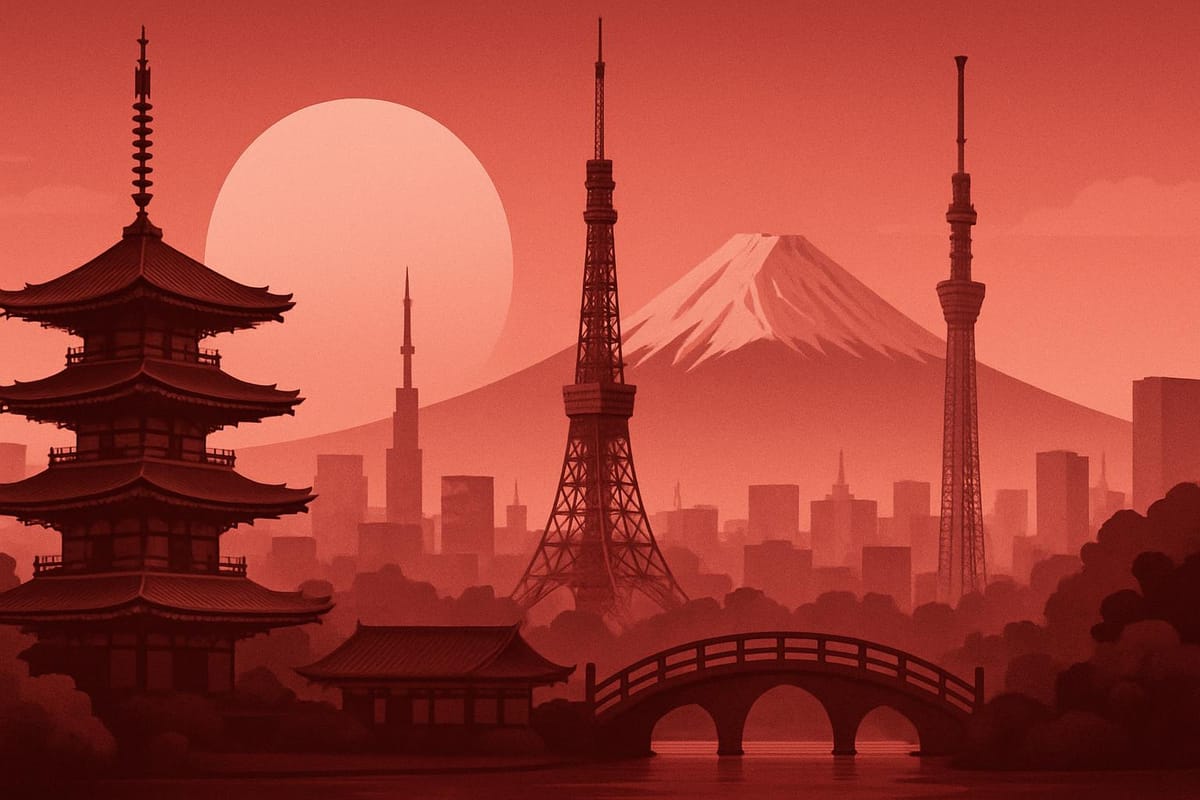Tokyo
Discover neon nightlife, temples, sushi, cherry blossoms, shopping & cutting-edge tech.

Important things to know about Tokyo
Tokyo, Japan is a vast, pulsating metropolis where modernity and tradition weave into an everyday urban fabric that defines contemporary city life; as one of the world’s leading economic centers, Tokyo blends high-tech industries, finance, creative sectors and small family-owned businesses into a dynamic economic ecosystem that supports a dense, diverse population and attracts talent from across Japan and abroad. The city’s streets and avenues reflect a layered history and a forward-looking mindset, with architecture that ranges from compact, efficient housing to gleaming office towers, all connected by an exceptionally reliable transportation network that underpins daily life and commuting patterns. Residents experience a distinctive Tokyo lifestyle characterized by intense work rhythms, meticulous public services, a rich culinary culture beyond mere dining-shaped by seasonal ingredients and neighborhood specialties-and a strong emphasis on cleanliness, safety and civic responsibility. Urban planning in Tokyo often balances limited space with innovative design solutions, resulting in multifunctional areas where commercial, residential and communal activities coexist; green pockets, riverside promenades and local markets contribute to quality of life even amid high population density. Cultural expression is visible in everyday rituals, community festivals, artisanal crafts and contemporary art scenes that nourish social identity and local pride. For anyone researching Tokyo for relocation, business, study or cultural insight, understanding its blend of innovation, resilience and respect for social harmony is essential to appreciating how this global city functions and evolves.
Sightseeing hot-spots in Tokyo
Tokyo is a city of exhilarating contrasts where ancient temples sit quietly beside neon skyscrapers, offering countless sightseeing opportunities for first-time and returning visitors to Japan. Wander through the historic streets of Asakusa to feel the atmosphere around Senso-ji and then step into the electric energy of Shibuya Crossing, one of the world’s most photographed intersections. The harmony of tradition and modernity is visible in neighborhoods like Meiji Shrine and Harajuku, where peaceful forested shrines meet avant-garde fashion, making Tokyo sightseeing a journey through time and style.
Food is central to the Tokyo experience, and the city’s culinary attractions make it a top destination for food lovers and tourists alike. From Michelin-starred sushi counters to bustling izakayas and yakitori alleys, sampling sushi, ramen and seasonal street food is essential among the things to do in Tokyo. Parks and gardens such as Ueno and the Imperial Palace East Gardens provide serene escapes and spectacular cherry blossom viewing in spring, while museums and galleries display both traditional art and cutting-edge contemporary work that reflect Japan’s rich cultural tapestry.
Getting around is easy thanks to an efficient subway and rail network that connects major attractions, shopping districts like Ginza and Akihabara’s electronics wonderland, and panoramic viewpoints including Tokyo Skytree and the classic Tokyo Tower skyline. Whether you’re chasing vibrant nightlife in Shinjuku, seeking quiet moments in temple courtyards, or planning day trips to nearby Mount Fuji, Tokyo’s attractions satisfy every kind of traveler. Thoughtful planning and an open spirit will turn sightseeing in Tokyo into an unforgettable chapter of your Japan travel story.
Hotels to enjoy in Tokyo
Tokyo offers an extraordinary range of hotels in Tokyo to suit every traveler, from sleek skyscraper properties with sweeping city views to intimate boutique stays tucked into quiet neighborhoods. Whether you’re searching for Tokyo hotels near Shinjuku and Shibuya for nightlife and shopping, a luxury retreat in Ginza, or a charming ryokan-inspired option in Asakusa, the city’s accommodation spectrum is immense. Business travelers will appreciate easy access to Tokyo Station and major subway lines, while leisure guests often seek hotels with on-site dining, wellness facilities, and panoramic observation decks. Unique lodging types like capsule hotels and themed boutique properties add cultural flair, and many international chains sit alongside locally owned establishments that highlight Japanese hospitality and design. Emphasizing convenience, value, and authentic experiences, Tokyo’s lodging scene blends modern amenities-high-speed Wi-Fi, fitness centers, and multilingual staff-with traditional touches such as tatami rooms and in-house tea ceremonies.
To find the best hotels in Tokyo, consider your priorities: proximity to public transit, skyline views, family-friendly rooms, or luxury services like concierge and Michelin-starred restaurants. Seasonal events like cherry blossom viewing and major trade fairs affect availability, so book early to secure the most desirable rates and room types. Budget-conscious travelers can locate excellent budget hotels in Tokyo and business hotels that deliver cleanliness and comfort without premium price tags, while those seeking indulgence will discover top-tier suites and exclusive club lounges. Read recent guest reviews, compare cancellation policies, and check whether breakfast or airport transfers are included to maximize value. With careful planning and awareness of neighborhoods and amenities, selecting the right Tokyo hotel becomes an enjoyable part of the travel experience, ensuring memorable stays in one of the world’s most dynamic cities.
Restaurants to try in Tokyo
Tokyo restaurants offer an exhilarating mix of tradition and innovation, making the city a must-visit destination for food lovers and anyone searching for the best restaurants in Tokyo. From the meticulous elegance of kaiseki dining to the comforting warmth of late-night izakaya joints, the Tokyo food scene covers every taste and budget. Renowned neighborhoods like Ginza, Shinjuku, Shibuya, and Asakusa host everything from sleek, Michelin-starred tasting menus to cozy back-alley ramen shops; meanwhile historic markets near Tsukiji serve up fresh seafood that anchors many top sushi experiences. Whether you crave a ramen bowl perfected over generations, delicate sashimi served as part of an omakase experience, or grilled skewers at a bustling yakitori bar, Tokyo restaurants deliver both authenticity and cutting-edge creativity that food-focused travelers frequently search for when looking for "Tokyo dining" or "best restaurants Tokyo."
To get the most out of Tokyo dining, plan for reservations at high-demand places and be ready to explore seasonal tasting menus that showcase Japan’s emphasis on fresh, local ingredients-search terms like "best restaurants in Tokyo for sushi" and "Tokyo ramen shops" often highlight these specialties. Don’t overlook casual options such as conveyor-belt sushi, vibrant street food stalls, and intimate counters where chefs prepare dishes right in front of you; these experiences are as emblematic as fine dining. Understanding a few dining customs-like punctuality, quiet conversation in small spaces, and the appreciation of presentation-will enhance your visit to Tokyo restaurants. As you discover the city’s culinary diversity, from high-end omakase to comforting bowls of ramen, you’ll find a blend of flavors and atmospheres that defines Tokyo as a global epicenter for gastronomy.
Best shopping stops in Tokyo
Tokyo is a paradise for shoppers, with Tokyo shopping offering everything from high-end designer boutiques to quirky streetwear stalls. The shopping highlights of Tokyo span iconic neighborhoods such as Ginza, where elegant department stores and luxury brands create a polished retail experience, and Shibuya, famous for its youthful energy and flagship stores. For trend seekers, Harajuku and Omotesando showcase avant-garde fashion, vintage finds, and independent designers, while Akihabara is a mecca for electronics, anime goods, and collectible tech. Wandering through bustling arcades and side streets reveals hidden gems-artisan crafts, niche beauty products, and limited-edition collaborations-that make shopping in Tokyo feel both cosmopolitan and uniquely local.
Beyond the neighborhoods, practical shopping tips enhance the experience: many stores offer tax-free shopping for foreigners and extended hours in popular districts, making it easier to explore after sightseeing. Food markets and specialty shops deliver memorable souvenirs, from gourmet snacks to handcrafted ceramics, complementing the glossy department store scene. Whether you seek luxury labels, indie boutiques, or the latest gadgets, the diversity and vibrancy of Tokyo shopping districts ensure a rewarding retail adventure in Tokyo, Japan, where every street can lead to an exciting new discovery.
Nightlife highlights in Tokyo
Tokyo's nightlife offers a dazzling mix of neon-lit streets, late-night eats, and vibrant entertainment that defines Tokyo nightlife for visitors and locals alike. From the buzzing intersections of Shibuya to the towering skyscrapers of Shinjuku, each neighborhood presents a different flavor: Roppongi for upscale bars and international clubs, Shimokitazawa for indie music and cozy live houses, and Golden Gai for tiny themed bars that feel like stepping back in time. The city's efficient transport and late-night options mean the fun often continues until dawn, making Tokyo nightlife accessible and exciting whether you seek high-energy dance floors or a quiet corner to sip sake.
Beyond the districts, the real draw is the variety of after-dark experiences - rowdy nights of karaoke with friends, intimate evenings at an izakaya sampling yakitori and sake, and the pulsing energy of modern nightclubs where international DJs spin until morning. Street food stalls and late-night ramen shops offer delicious refueling options between stops, while themed cafes and live performance venues add unforgettable local flavor. For travelers optimizing their evening plans, Tokyo delivers safety, convenience, and endless choices, ensuring every night becomes a memorable chapter in the city’s legendary nocturnal story.
Getting around in Tokyo
Tokyo's airport and train situation is one of the world’s best-integrated systems, with Haneda serving as the convenient urban gateway for many domestic and international travelers and Narita handling a large share of long-haul international flights; efficient rail links like the Narita Express, Keisei Skyliner, and Tokyo Monorail connect airports to central Tokyo quickly while the city's dense JR and Tokyo Metro networks, complemented by Toei lines and frequent Shinkansen departures from Tokyo Station, make intercity and commuter travel seamless. For tourists and business travelers the availability of rechargeable IC cards such as Suica and PASMO simplifies transfers between airports, trains and buses, and multilingual signage, customer service counters and airport transfer options like the Airport Limousine buses improve accessibility. Trains in Tokyo are known for their punctuality and high frequency, though they can be very crowded during peak commute hours; careful planning, off-peak travel when possible, and choosing express airport trains can save time. Overall, the combination of world-class airports, an extensive rail network, and integrated ticketing makes Tokyo’s public transportation system a top choice for efficient, reliable urban and regional travel.
Culture must-see's in Tokyo
Tokyo is a city where traditional rituals and cutting-edge trends coexist in everyday life, making the culture highlights of Tokyo endlessly fascinating for visitors and locals alike. Wander through Asakusa to find the quiet reverence of ancient temples and the lively stalls of a historic shopping street, then contrast that with the serene walkways of the Meiji Shrine tucked beside the bustling neighborhoods. The performing arts scene brings centuries-old forms like Kabuki and Noh to stages alongside contemporary theater and experimental dance, while sumo tournaments and seasonal matsuri festivals showcase communal pride and continuity in Japanese culture. Museums in Ueno and independent galleries across the city preserve and reinterpret traditional crafts, fine art, and design, offering a layered picture of Tokyo’s cultural evolution.
Beyond heritage sites, modern urban culture is a highlight of Tokyo’s appeal: neon-lit districts, fashion-forward streets, and a tech-driven entertainment landscape that defines global pop culture. In Shibuya and Harajuku, street fashion and youth culture set trends that ripple worldwide, while Akihabara remains the epicenter for anime, gaming, and electronics enthusiasts. Culinary culture is equally diverse, from world-renowned sushi counters and Michelin-starred restaurants to cozy izakaya and vibrant street food markets, reflecting Tokyo’s ability to honor tradition while embracing innovation. Seasonal events like cherry blossom viewing and rooftop festivals add rhythm to the year, ensuring that the culture highlights of Tokyo are as dynamic and inviting as the city itself.
History of Tokyo
Tokyo’s long and layered history begins before it was called Tokyo, when the marshy estuary settlement around Edo Bay gradually grew into a powerful urban center. In 1603 Tokugawa Ieyasu established the Tokugawa Shogunate, choosing Edo as his seat of power; over the next two centuries Edo transformed from a modest castle town into one of the largest cities in the world, a flourishing hub of commerce, artisan culture, and popular entertainment. The complex social order of the shogunate era produced a vibrant urban culture - from ukiyo-e woodblock prints to kabuki theater - and Edo’s rising merchant class helped create the economic foundations of modern Japan. As the city expanded its canals, roads, and neighborhoods, Edo became synonymous with dense urban living and civic organization, while the symbolic presence of Edo Castle anchored political authority. Throughout this period Tokyo history was defined by contrasts between the courtly ceremonies in Kyoto and the pragmatic, bustling life of Edo, a dynamic that set the stage for dramatic political and social change.
The Meiji Restoration of 1868 marked a watershed in the history of Tokyo, when the emperor returned to Edo and the city was renamed Tokyo, the “Eastern Capital,” signaling Japan’s rapid modernization and centralization. The new capital embraced Western technology and infrastructure: railways, modern schools, factories, and a Western-style government reshaped the urban landscape and the daily life of residents. Tokyo endured catastrophic events that also shaped its character, notably the 1923 Great Kanto Earthquake, which led to massive reconstruction and urban planning reforms, and the devastation of World War II air raids that required postwar rebuilding. The subsequent decades saw a remarkable revival - the economic miracle, the 1964 Olympics, and continuous expansion of transportation networks like subways and high-speed rail cemented Tokyo’s role as a global metropolis. Today the Tokyo Metropolis blends centuries of tradition with cutting-edge architecture, technology, and cultural production; its temples and festivals coexist with neon-lit districts and skyscrapers, making Tokyo’s history a continuous story of resilience, reinvention, and the interplay between heritage and modernity.



